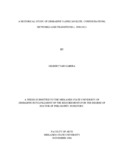Please use this identifier to cite or link to this item:
https://cris.library.msu.ac.zw//handle/11408/1880| Title: | A historical study of Zimbabwe’s African Elite: configurations, networks and transitions c.1900-2013 | Authors: | Tarugarira, Gilbert | Keywords: | African elites, social capital, socio-economic, political context, Zimbabwe | Issue Date: | Nov-2016 | Publisher: | Midlands State University | Abstract: | This thesis employs ‘elite’ and social capital as analytical tools to explore the history of African elite formation and the development of power relations within a socio-economic and political context in Zimbabwe. Using the case of elites from the Gutu district of southern Zimbabwe the thesis traces patterns of social differentiation and mutation of elite organisation. Besides unpacking the diverse elite groups, I seek to explore elitist modes of social reproduction and transmission of privileged positions in society. Contrasting patterns of recruitment and selection in terms of career paths, the relative influence, visibility, power and prestige of different elite groups are considered. The thesis underscores that networking contacts among the elites occurred both formally and informally. My central argument is that within the diversity of elite typologies, networks facilitated resource mobilization and ultimate access to power. This is largely viewed through the prevalence of elitist enclaves and clusters and their interaction with socio-economic and political environments in both country and town settings. Many of the individuals referred to in this study were pluralists of power who held influential positions in a number of elite groups. The thesis contends that due to elite ‘interlock’, intra-and extra socio-economic and political networks were established towards the realization of material rewards and privileges. I pursue these network concerns to develop insights into how new forms of inequality are created. Antonio Gramsci’s theory is used to draw attention to the question of hegemony in an attempt to reconcile perceived notions concerning the development and functions of elite groups in relation to serving the wider public and their endeavour to enhance and maintain power. The study reveals that while the elite continuously seek to acquire more resources through networking and predatory means, strategies deployed in manufacturing selves are generally embedded in a continuum from pre-colonial to post-colonial historical contexts. The qualitative nature of the research afforded the convergence of information from oral and archival sources as well as documents and texts. | Description: | A Thesis by Dr Gilbert Tarugarira a Lecturer in the Department of Historical Studies, Midlands State University | URI: | http://hdl.handle.net/11408/1880 |
| Appears in Collections: | Thesis |
Files in This Item:
| File | Description | Size | Format | |
|---|---|---|---|---|
| Tarugarira thesis.pdf | Full Text | 2.22 MB | Adobe PDF |  View/Open |
Page view(s)
222
checked on Mar 3, 2026
Download(s)
2,662
checked on Mar 3, 2026
Google ScholarTM
Check
Items in MSUIR are protected by copyright, with all rights reserved, unless otherwise indicated.



